Exploring the Depths of Ramadan Iftar Time
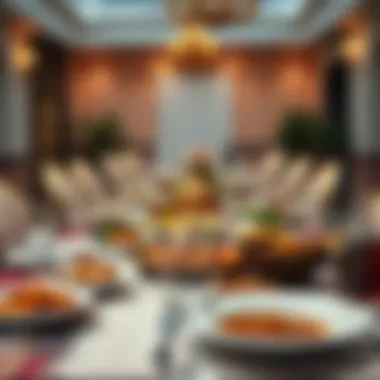
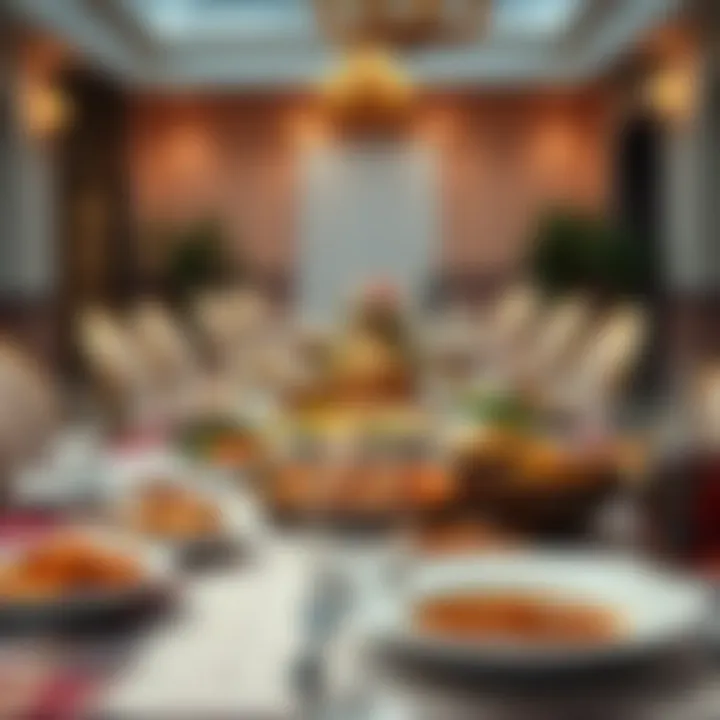
Intro
Ramadan is a month of deeply rooted traditions and spiritual reflections for Muslims globally. Among the rituals observed, the iftar—the meal to break the fast after sunset—holds a special place. This moment goes beyond mere sustenance; it represents community, gratitude, and celebration. The timing of iftar is not just a matter of routine; it significantly influences daily life during Ramadan. Whether you’re part of the community or an observer, understanding this practice enriches the overall experience of this holy month.
Importance of Iftar Timing
The iftar meal marks the end of a day's fast. Knowing the precise time to break one's fast is paramount. It fosters a sense of harmony and unity among families and communities. Traditionally, iftar is begun with dates and water, following the example of the Prophet Muhammad. This practice remains consistent across cultures, yet the diversity in cultural traditions and culinary offerings enhance the iftar experience worldwide.
"Timing is of the essence; knowing when to embrace the meal can truly make the spiritual moment more impactful."
Cultural Variations in Iftar
Around the world, different cultures add their own flavor to iftar through unique dishes and practices. In countries like Turkey, you might find soup served first, while in Egypt, koshari, a mix of lentils, rice, and pasta, takes center stage. Each region’s customs not only reflect local tastes but also the community's collective identity.
- Middle Eastern Countries: Often feature shared plates filled with colorful spreads, including hummus, tabbouleh, and freshly baked bread.
- South Asia: Iftar meals often include samosas and chapati, with various sweet dishes rounding off the meal.
- Western Nations: Here, you might see a blend of traditional foods influenced by local cuisine, often accompanied by family gatherings or community events.
This kind of cultural exchange during Ramadan can help bridge gaps and foster understanding among diverse communities, making it a joyful time, even for those outside the faith.
Broader Implications
Delving into the complexities of iftar helps illustrate broader themes of Ramadan, such as charity and community building. This meal isn’t merely a personal affair; it serves as an opportunity to invite family, friends, and sometimes even strangers. Many Muslims participate in communal iftars, aiming to create inclusive environments that foster kindness and sharing.
Understanding the nuances of iftar timing and its cultural significance provides a gateway into the heart of Ramadan. This comprehensive knowledge enriches one’s comprehension of the spiritual and communal dynamics at play during this sacred month.
Intro to Ramadan
Ramadan stands as a cornerstone of Islamic faith, representing more than just a month of fasting. It’s a time of deep reflection, rejuvenation, and community bonding. In this discussion about Ramadan, understanding its nuances can significantly enhance one's appreciation of the iftar—the cherished meal that concludes the day’s fast. Exploring Ramadan provides insights into the spiritual and cultural aspects that have shaped this period over centuries. Moreover, gaining knowledge about Ramadan helps in grasping the broader significance of fasting—to foster empathy for those facing hunger and to strengthen one's connection with faith.
Definition and Importance
The word Ramadan is derived from the Arabic root ramida, which means "to be intense," reflecting the heat of the sun and the intensity of spiritual practice during the month. For Muslims worldwide, Ramadan symbolizes a sacred time intended for spiritual growth, self-discipline, and social responsibility. Beyond the abstention from food and drink during daylight hours, it encompasses increased prayer, recitation of the Quran, and community service.
During Ramadan, the experience of iftar is crucial. It’s the moment when families and friends gather to break their fast, emphasizing community and gratitude. The importance of iftar lies not just in the physical act of eating but in the communal spirit it fosters, reminding practitioners of their shared beliefs and experiences.
Historical Context
Historically, Ramadan’s roots trace back to the revelations received by the Prophet Muhammad in the 7th century, marking the month as a time for reflection and growth. However, the customs surrounding iftar evolved over the ages. Initially, breaking the fast involved simple dates and water, reflecting the community's modest resources.
As the Muslim community expanded across various cultures, iftar traditions began adapting local flavors and practices. Thus, you can see a rich tapestry of culinary practices that vary significantly from one region to another. Understanding this historical background elucidates how religion intersects with local culture and social practices, shaping the way Ramadan is observed today.
Global Observance
Around the globe, Ramadan is celebrated with distinct yet unified practices. In countries like Saudi Arabia, the evenings are filled with vast feasts that often extend late into the night. In contrast, in a place like Indonesia, iftar might be characterized by a more subdued atmosphere, where family gatherings emphasize simplicity and reflection. Ethnic diversity enriches the observance, evident in regions where local dishes infuse traditional Ramadan meals.
The idea of fasting brings communities together in various societies. Governments in Muslim-majority countries often adjust work hours to accommodate fasting schedules, highlighting the month’s societal importance. Furthermore, interfaith gatherings during Ramadan increasingly promote understanding and respect among diverse groups, showcasing how Ramadan’s observance transcends religious barriers.
By analyzing these dynamics, one gains a holistic picture of Ramadan's significance, shedding light on why this month is not only profound for Muslims but resonates across nations as a period of introspection and community solidarity.
Significance of Iftar
The ritual of iftar holds profound significance during Ramadan, representing not only a daily meal but a cherished moment of connection, reflection, and community. It serves as an essential point at which the fast is broken daily, signifying the end of a day of restraint and the beginning of celebration and gratitude. For many, this daily event offers comfort and embodies the spirit of togetherness that defines the holy month.
Culturally, iftar acts as a centerpiece for diverse social interactions, allowing families and friends to come together after the fasting hours. In many cultures, the act of sharing this meal transcends mere nourishment. It fosters a sense of belonging and unity, bridging gaps between different generations and backgrounds.
Iftar is also a vibrant showcase of culinary traditions, often varying from one region to another, further enhancing its significance. Each meal brings with it a historical context and a collection of flavors that reflect the rich tapestry of the respective culture. Traditional dishes, often prepared with care and passed down through generations, evoke nostalgia and memories that bind families.

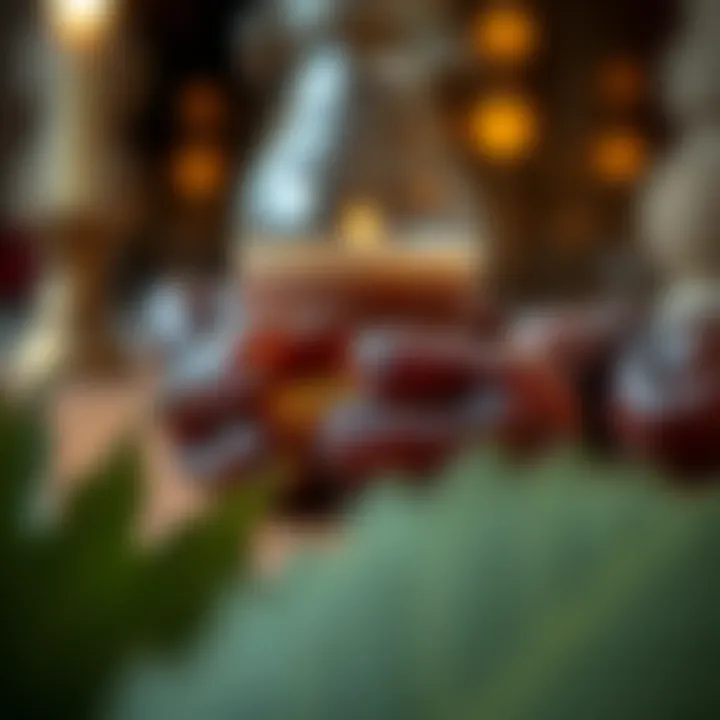
Cultural Importance
In many Muslim-majority countries, iftar takes on a life of its own, transforming the evenings into festive occasions. Streets may be adorned with lights, and the aroma of various dishes fills the air as food stalls pop up, providing a wide array of options for those breaking their fast. The communal aspect is crucial here. Iftar often involves inviting neighbors and friends, regardless of their background, to partake in the meal.
Practices such as organizing community iftars, where large groups gather to share food, exemplify how deeply intertwined food is with relationships and social structures within communities. The sense of giving and sharing is amplified during this time, as many individuals opt to sponsor iftars or contribute to food drives. Not only do these acts reinforce community ties, but they also help those less fortunate to partake in the iftar experience.
Spiritual Reflections
On a spiritual level, iftar represents more than just the physical act of eating. It suggests moments of mindfulness and gratitude. The fast initiates a period of reflection and contemplation, allowing individuals to reassess their relationships with food, family, and faith. Moreover, the act of breaking the fast is often accompanied by prayers, further deepening the spiritual significance. In many homes, the meal traditionally begins with dates and water, echoing the practices of the Prophet Muhammad, establishing continuity with the past.
"Iftar is a reminder of the virtue of patience and the value of sustenance, not just for the body but for the soul."
The evening meal also encourages individuals to examine their spiritual well-being. The communal breaking of the fast can create a sense of belonging, enhancing the bond within the community and invigorating personal spirituality through shared experiences. The tranquility that follows the iftar meal often facilitates discussions about faith and intentions, serving as a catalyst for self-improvement and renewal throughout the month.
Through exploring these various aspects, we can see that iftar is not merely a meal; rather, it's a dynamic convergence of culture, spirit, and community, playing a multifaceted role during the Ramadan observance.
Timing of Iftar
Understanding the timing of iftar is crucial for those observing Ramadan. This is the moment when the fast is broken, making it a significant occasion both culturally and spiritually. In this section, we delve into various aspects of iftar timing, addressing pertinent elements, benefits, and considerations for different individuals and communities.
Understanding Sunset Timing
The exact moment for iftar varies with the setting sun, which can be different based on geographical location, date, and local practices. Knowing when to begin the evening meal is essential for Muslims who are fasting. The timing is typically marked by the adhan, or call to prayer, which signals the end of fasting for the day.
In many places, local mosques broadcast the adhan, but there are also smartphone apps available that provide precise timing. It's wise to check resources that offer sunset times and Islamic prayer schedules, such as islamsociety.org or regional mosque websites, to ensure you are observing correctly.
Culinary Aspects of Iftar
Iftar holds a special place in the hearts of those observing Ramadan. It transforms from a mere meal into a celebration of culture, tradition, and community spirit. This section will explore the culinary aspects of iftar, focusing on why the food we eat at this time is not just about nourishment but also reflects a rich blend of history, regional taste, and social gathering.
Traditional Dishes
In many cultures, breaking the fast with specific foods is common. Common traditional dishes selected for iftar typically carry unique significance or historical roots. Dishes like dates, a staple at iftar, are often used to break the fast, symbolizing both health and tradition. They provide a quick energy boost after a long day without food or water. In Middle Eastern cultures, samosas or pakoras often appear at iftar tables, fried to a golden brown, encapsulating vibrant spices that awaken the senses.
Another dish that graces many iftar tables is harira, a Moroccan soup made with tomatoes, lentils, and chickpeas. Not only is it comforting, but it also showcases the blend of spices that celebrate local culinary heritages.
"Food made with love becomes nourishment for the soul as well as the body."
Iftar is not just about the meal but also the act of assembling those dishes, which solidifies family bonds and friendships. Families often put their own spin on traditional recipes, making them unique to their home, symbolizing love and hospitality.
Regional Variants
As with any tradition, regional variations emerge as cultures blend and evolve over time. In Indonesia, for instance, the iftar experience is marked by kolak, a sweet dish made from bananas and palm sugar. In southern Asia, particularly in India and Pakistan, biryani dominates the scene, representing a joyous and lavish feast that unites families around a table.
In Turkey, the blend of flavors is represented through pide, a boat-shaped bread stuffed with meat and vegetables. Meanwhile, in North Africa, couscous is often the centerpiece, reflecting a culinary tradition that spans centuries. Each variant isn't merely a dish; it embodies the local customs, preferences, and available ingredients, showcasing the universal love for coming together over food.
Popular Beverages
No iftar is complete without a selection of beverages that not only quench thirst but also complement the meal. Many prefer to break their fast with water or sherbets, sweet drinks made from fruits, particularly popular during this holy month. In many Arab countries, jalab is a favored choice, made from dates, rose water, and sometimes mixed with nuts.
Tamarind juice often garners attention for its refreshing sourness, revitalizing tired bodies post-fast. In South Asia, lassi, a yogurt-based drink, complements spicy dishes, balancing the heat while offering a refreshing experience. Each beverage plays a role, not only in hydration but also in enhancing the overall dining experience.
The culinary aspects of iftar highlight the beautiful tapestry woven by various cultures, bonding families and communities in a time-honored tradition. As we delve deeper into the significance behind these culinary choices, it becomes clear that iftar is much more than a meal—it's an opportunity to share, celebrate, and connect.
Iftar in Dubai


Dubai stands as a vibrant confluence of tradition and modernity, making its Iftar during Ramadan a unique spectacle. The meticulous attention to cultural practices combined with an international flair attracts locals and expatriates alike. This blend not only enhances the experience of breaking the fast but also reaffirms the significance of community and togetherness during this holy month.
Local Traditions
In Dubai, the act of Iftar transcends mere sustenance. Families gather around tables laden with a feast that reflects the rich tapestry of Emirati culture intertwined with global influences. Common traditions include starting the meal with dates and water, a practice rooted in Islamic tradition and known for its health benefits after a day of fasting. The moment the call to Maghrib prayer resonates through the air, it marks a moment of community spirit; neighbors and friends often share their Iftar meals, fostering a sense of belonging.
Food plays a pivotal role in these local traditions. Dishes such as haris (a slow-cooked dish of wheat and meat) and majboos (spiced rice with meat) are staples at Iftar tables. Residents also savor Arabic coffee, symbolizing hospitality, while sweets like kunafa and qatayef enchant the palate, breathing life into the communal atmosphere.
The essence of local customs serves to remind everyone, whether resident or visitor, of the core values of sharing and gratitude inherent in Ramadan.
Popular Iftar Spots
Dubai boasts a plethora of dining spots that offer Iftar experiences suited for all tastes. Some notable venues include:
- The Burj Al Arab: Famous for its opulence, the Iftar buffet here includes an extensive spread of international and local delicacies, attracting those seeking luxury during Ramadan.
- Atlantis The Palm: Known for hosting grand occasions, their Iftar is a gastronomic journey, featuring numerous live cooking stations.
- Al Seef: Infusing heritage with modernity, this waterfront destination serves local dishes in a traditional setting, ideal for families and friends to gather.
Those who prefer a more casual setting often visit the Rooftop Lounges and Food Trucks scattered around the city, providing delicious options while enjoying the picturesque skyline.
Community Gatherings
Dubai’s vibrant community spirit is palpable during Ramadan, especially during Iftar. Many local mosques host community Iftar gatherings, inviting everyone, regardless of their faith, to join in the breaking of the fast. It’s not uncommon to see large tents set up serving free meals to all who attend, promoting solidarity among different communities. Events like these encourage inclusivity and cultural exchange, as people gather to share food, stories, and traditions.
Additionally, various organizations and NGOs coordinate initiatives where residents contribute by organizing food drives. These efforts mirroring the teachings of charity in Islam instill a sense of purpose among participants, encouraging shared responsibility and compassion.
Breaking fast isn’t just about fulfilling physical hunger; it’s an opportunity for spiritual growth, social engagement, and cultural appreciation in Dubai during the holy month of Ramadan.
"Community events during Iftar reinforce the bond among people, fostering friendship and cultural understanding, making Dubai not just a place to fast but a community to belong to."
In sum, the Iftar scene in Dubai reflects the essence of Ramadan—faith, compassion, and the importance of togetherness. It’s a time where culinary delights meet cultural traditions, creating a warm atmosphere that envelops all who partake, making it a profound experience well worth savoring.
Iftar and Social Interactions
The evening meal of iftar offers more than just relief from a long day of fasting. It stands as a testament to the values of community, togetherness, and shared experiences that define social interactions during Ramadan. Beyond fulfilling physical hunger, iftar fosters connections among friends, families, and even communities, bringing people together in a spirit of unity and celebration.
Breaking Bread Together
At its core, breaking bread embodies a time-honored tradition where food plays the role of a bridge between hearts. When the call to maghrib prayer resonates, families gather around the table, eagerly anticipating their first bites of food after dusk. This moment is not merely a meal; it's a ritual laden with meaning. For many, the first taste of something sweet like dates or fresh fruit is a reminder of the blessings in their lives.
Sharing iftar with loved ones transforms this daily observance into a communal activity. Homes are filled with laughter, stories, and reflections on the day's experiences. In some cultures, this inviting atmosphere extends beyond immediate family; neighbors or friends often join in, turning these gatherings into vibrant social events. Whether at a large banquet hall or in a cozy living room, the essence remains—food shared among people strengthens bonds.
Community Building
Iftar serves as a vital component in building and nurturing community ties. During this holy month, mosques and community centers often host larger iftar events, inviting everyone—regardless of their background—to partake. Here, cultural barriers fade away as diverse groups gather, contributing dishes that reflect their heritage. This melting pot of flavors paints a rich tableau of shared culture and mutual respect.
Moreover, these community iftars underline the values of generosity and inclusion. In urban landscapes where people might feel disconnected, the communal iftar re-establishes those essential human links, reminding us to stand together.
In light of these gatherings, it becomes clear that the practice of sharing iftar benefits not only those who partake but enriches communities. It creates a sense of belonging and emphasizes our shared humanity.
As we observe these interactions in diverse settings—from lavish feasts to simpler gatherings—one cannot overlook the role they play during this sacred month. Iftar transcends mere nourishment; it cultivates an environment of empathy, understanding, and respect that lingers well beyond Ramadan.
“Food is symbolic of love when words are inadequate.”
—A. V. T. K.
In sum, the interactions fostered during iftar illustrate its significance as more than a time to eat. It becomes an expression of belonging, a reinforcement of community values, and an opportunity to engage deeply with one another. Uniting around food, despite differences, creates a powerful shared experience that resonates in everyday life. Through understanding the dynamics of iftar and social interactions, one begins to comprehend the deeper currents of Ramadan.
Health Considerations
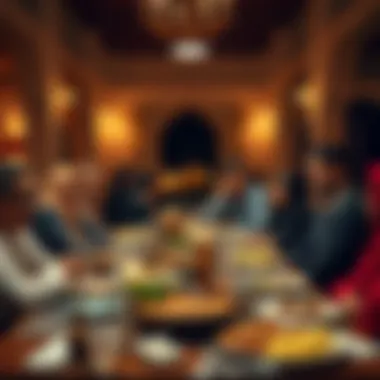
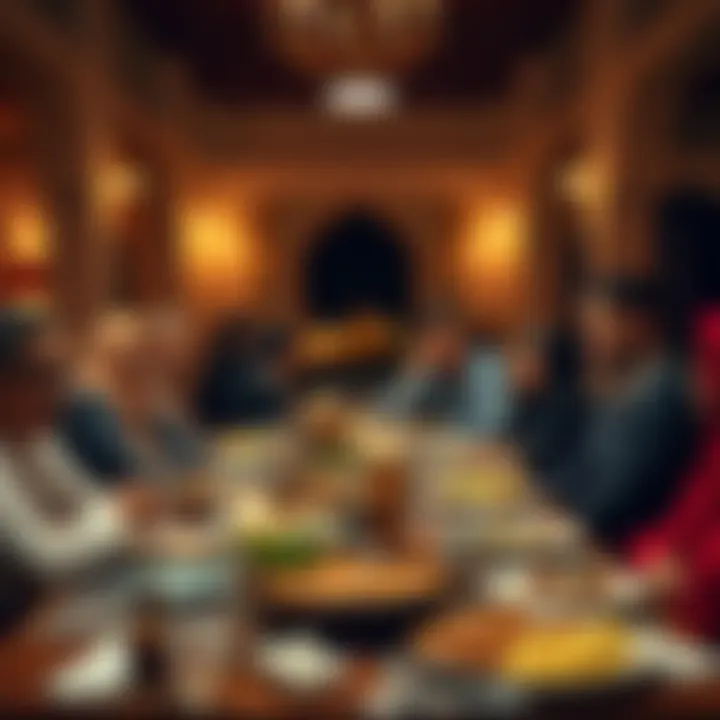
The importance of health considerations during Ramadan cannot be overstated. Fasting is not merely a spiritual journey but also presents unique challenges and opportunities for physical health. A well-planned iftar can considerably impact one’s overall health, with particular focus on the nutritional balance and hydration levels that must be maintained throughout the fasting period. It’s essential that individuals are aware of how to ensure they are supporting their bodies properly during this month.
Nutritional Focus
A balanced diet breaks the day’s fast, and the focus should be on nutrients that can provide sustained energy and overall wellness. During iftar, it is important to not just replenish what was missed throughout the day but to do so wisely. Prioritizing whole foods over processed options enhances the body’s recovery after fasting.
Essential nutrients include:
- Complex Carbohydrates: These provide long-lasting energy. Foods such as whole grains, brown rice, and quinoa are excellent choices.
- Healthy Fats: Nuts, avocados, and olive oil can help reduce inflammation and provide essential fatty acids.
- Proteins: Lean meats, fish, and legumes help in tissue repair and muscle recovery.
- Vitamins and Minerals: A variety of vegetables and fruits should be included to ensure an ample intake of essential vitamins and minerals.
To make it more manageable, some might prepare iftar meals that have a clear food pyramid layout, where a variety of food types make for a colorful, balanced plate.
Fasting and Hydration
Hydration plays a critical role during Ramadan, especially given the long hours of fasting. After fasting all day, individuals may be tempted to gulp down water and sugary drinks, but that can lead to discomfort or digestive issues. It's wiser to ease into hydration slowly.
Here are some helpful tips for proper hydration:
- Start with Water: When breaking the fast, begin with a glass of water to gently rehydrate the body.
- Include Hydrating Foods: Watermelon, cucumbers, and oranges are good additions to iftar, providing water along with vital nutrients.
- Limit Caffeinated Beverages: Coffee or tea can lead to dehydration, especially in this crucial recovery phase. It's best to minimize intake during iftar.
- Set a Hydration Schedule: Plan to consume a set amount of water between iftar and suhoor (the pre-dawn meal) to ensure proper hydration levels by the next day.
Staying hydrated isn’t just about drinking water; it’s a holistic approach that marries smart eating habits with mindful drinking.
Considerations for health during Ramadan highlight how the physical and spiritual aspects of fasting intersect, making a well-rounded iftar essential for maintaining good health. It can make the difference between feeling drained and recharged as the month unfolds.
Iftar for Non-Muslims
The iftar, the meal that breaks the fast each evening during Ramadan, is not solely limited to those observing the holy month. It carries a significance that extends to non-Muslims as well. For individuals outside the Muslim faith, participating in iftar serves as an opportunity to bridge cultural gaps, foster understanding, and engage with the local community in a meaningful way.
Cultural Understanding
For non-Muslims, grasping the cultural context of iftar is pivotal. It’s not just about food; it embodies the spirit of togetherness and generosity inherent in Islamic practices. During Ramadan, families prepare special dishes, often inviting friends and neighbors to join in the evening meal. This open-door philosophy fosters a sense of belonging and creates spaces where friendships blossom regardless of religious differences.
The traditions surrounding iftar can vary widely from region to region. For instance, in Turkey, friends might break their fast with sweet, sticky pastries like baklava and strong black tea, while in Egypt, koshari, a hearty mix of lentils, rice, and pasta, takes center stage. By understanding these cultural nuances, non-Muslims are better positioned to engage respectfully with the event.
"Joining in an iftar is a beautiful way to step into the customs of another culture and demonstrate respect and openness."
Participation Guidelines
For those curious about experiencing iftar as a non-Muslim, it's essential to approach it with consideration. Here are some key guidelines to keep in mind:
- Be Respectful: Understand that Ramadan is a sacred month for Muslims. It's vital to be respectful of the fasting observers during the daytime. Avoid eating or drinking in public during these hours.
- Ask Before You Join: If you're invited to an iftar, don’t hesitate to ask if it’s appropriate for you to attend. Hosts typically appreciate interest in their customs, but being courteous is crucial.
- Bring a Dish: If you’re attending a communal iftar, bringing a dish to share can be a nice gesture. It expresses a willingness to contribute to the gathering and can spark conversations about diverse culinary traditions.
- Learn the Language: If you can, familiarize yourself with basic Arabic phrases. Saying a simple "marhaban" (hello) or "shukran" (thank you) can go a long way in making connections and showing appreciation.
- Participate Actively: If the gathering involves prayers before or after the meal, be respectful whether you participate or observe. It’s an expression of solidarity, even if you do not share the same beliefs.
Ending
As we draw the curtains on this exploration of Ramadan and its profound significance, it's impossible to overlook the central role iftar plays in the lives of many. It's not merely a meal that breaks a fast; it embodies a wealth of cultural richness and community spirit. Iftar serves as a thread that weaves together the fabric of family gatherings, friendships, and the broader community, reminding us that sharing a meal is more than just about food.
Reflecting on Iftar's Role in Ramadan
Iftar is pivotal both spiritually and culturally. For Muslims, it marks the end of a day spent in self-restraint, contemplation, and devotion. The act of breaking bread together symbolizes unity and gratitude. People often prepare large quantities of food, inviting family, friends, and even strangers to join in. This tradition fosters a sense of belonging and breaks down barriers, encouraging intercultural interactions.
Every iftar is teeming with aromatic flavors and tantalizing dishes, but the most precious element is the company enjoyed around the table. Whether one finds themselves in Cairo or Karachi, the moment of iftar transcends geographical boundaries, reminding us of our shared human experience. Ultimately, it becomes a time for reflection not only of the day’s fast but also on the values of compassion, generosity, and gratitude.
Looking Ahead to Future Observances
Looking toward future Ramadan observances, the essence of iftar will undoubtedly remain in the spotlight. As communities evolve and cultures mix, the ways in which iftar is celebrated may transform. However, the underlying principles of togetherness and gratitude are constants that will endure. Future generations may explore innovative ways to uphold traditions while also incorporating new influences.
Moreover, understanding and appreciating iftar can foster a sense of respect and acknowledgment among non-Muslim communities. In an increasingly globalized world, encouraging participation can build bridges between cultures and promote peace.
So as we move forward, the invitation stands tall: whether you are sharing a meal with friends or participating in community gatherings, remember that iftar is more than a moment in time. It's a celebration of togetherness, resilience, and faith that connects us all.
"Breaking bread has always been a ritual of peace, making room for understanding in the simplest of gestures."
In essence, taking the time to reflect on iftar and its implications offers an enriching perspective. Not just for those who observe Ramadan, but for anyone seeking to build cultural empathy through the universal language of food.















